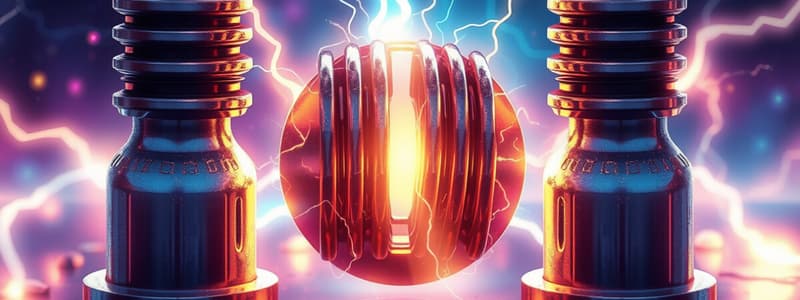Podcast
Questions and Answers
What is an electric conductor? Give examples.
What is an electric conductor? Give examples.
An electrical conductor is a substance in which electrical charge carriers move freely. Examples include silver and copper.
Explain why electric current doesn't flow through rubber.
Explain why electric current doesn't flow through rubber.
Their atoms hold onto their electrons tightly, so electric current cannot flow freely through them.
Should Jon use the lamp if he can see the conductor of the power cord? Why or why not?
Should Jon use the lamp if he can see the conductor of the power cord? Why or why not?
He shouldn't because he can start a fire or risk being electrocuted.
What are metals?
What are metals?
List several properties of metals.
List several properties of metals.
Explain why metals can conduct electricity.
Explain why metals can conduct electricity.
What is brass made of?
What is brass made of?
What is bronze made of?
What is bronze made of?
Why is steel widely used in construction?
Why is steel widely used in construction?
What is a substitution alloy?
What is a substitution alloy?
Flashcards are hidden until you start studying
Study Notes
Electric Conductors
- An electric conductor allows the flow of electrical charge carriers, mainly through metals.
- The best electrical conductors are silver and copper, which excel in conducting electricity.
Electric Insulators
- Rubber and other insulators have tightly held electrons, preventing the free flow of electric current.
Safety Considerations
- Exposed conductors, like in a power cord, pose a risk of fire or electrocution, advising against their use.
Properties of Metals
- Metals are characterized by being hard, shiny, malleable, fusible, and ductile.
- Good electrical and thermal conductivity are essential properties of metals.
Key Metal Properties
- Metals are typically shiny, solid, dense, and excellent conductors of electricity.
Electrical Conductivity in Metals
- The outer electrons of metal atoms are not tightly bound, allowing them to move freely when an electric current is applied.
Alloys
- Brass is an alloy composed of copper, zinc, and tin.
- Bronze consists of copper combined with tin and potentially other metals.
Steel Usage
- Steel is favored in construction due to its high tensile strength, providing durability and support.
Substitution Alloys
- Substitution alloys are homogeneous mixtures where components are uniformly dispersed.
Studying That Suits You
Use AI to generate personalized quizzes and flashcards to suit your learning preferences.




